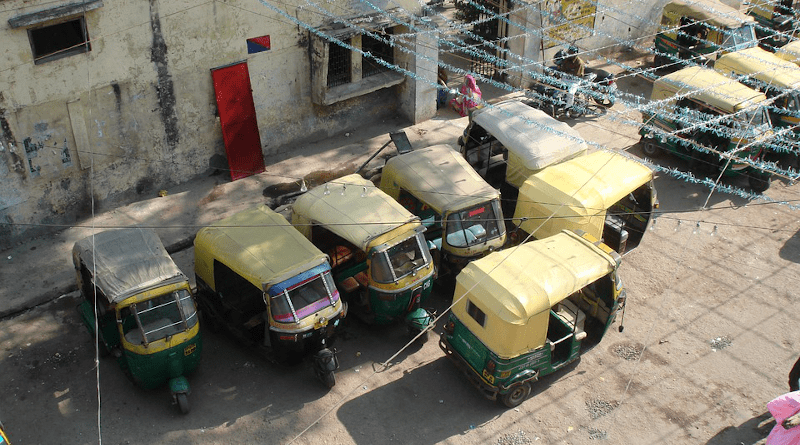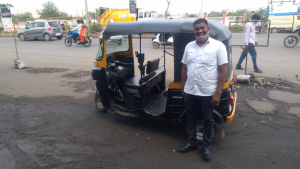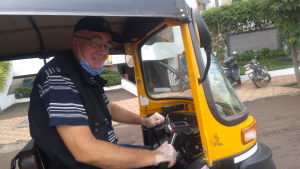Introspicere – India By An Expatriate Professor: Driving Rickshaw Through Life, Without Haste And Stress – Essay
By Prof. Dr. Sabahudin Hadzialic
The operatic view encompasses the rhythmic sounds of various sirens in Pune, a city of 10 million, in another “green” city in India, some 120 kilometers southeast of much-known Mumbai (with only a slightly larger population), which seems to show the tone of the conversation.
Yes, the conversation of baritone, bass, soprano, alto, mezzo-soprano, bass baritone. Over there, in Europe, and still, in the rest of the world, when we blow our horns, when we honk – we are angry, either at the vehicle in front of us, or some one who gets too close to us on the side, “behind” or at pedestrians crossing in an unforeseen place. In India, everything is “upside down”, but maybe, it is not?
It cannot be clear to a European, at least I was confused by these opera sounds and I had a feeling for the first seven days that everyone here was angry at everyone because the sounds are interactive. What about the police? The police are standing on every tenth corner and checking, you know what? If you wear a mask while in the vehicle. If they catch you, and they almost caught me, the punishment follows. My driver, Yavraj, saved my head (my wallet) – well, there will be a special sequel about him. But for now I will just say, he is by some to be imagined as “a poor” 35-year-old man who drives an auto-rickshaw in the city and a car for the university. And yet, in the countryside, ten kilometers from the city … he has a maid, the latest tractor and a 40-hectare plot of land on which he grows rice and has given part of it to a local investor to build apartments, while he will get ten apartments available in a building on his own land.
But I digress. As I mentioned above, Yavraj warned me in time for the first few days to lift the mask from my chin to cover my face as the police to punish violators. Dear God, the mask is also worn in the car. I can imagine what would happen in the country of Bosnia and Herzegovina (with a 3.5 million population) if someone told the people that a mask had to be worn. They would crucify him, ridicule him, shower him with tar and feathers while they have 30 dead a day. And yet, here in a city of 10 million inhabitants, there are sick people, but there have been no dead for ten days. Masks are worn. And in many ways, the citizens here have kept quiet about it. It’s a beautiful story about “stick and carrot”, but how this can be put within the heads of Bosnians and Herzegovinians of all faiths and nations (this “nation“ is really funny because a nation is equally a state, but since we have a country and not a state, let’s be)? Hard, really hard.
However, to return to the sounds and moods of the people here, the Indians. They are all Indians, in a country with 28 states, 36 languages and the beauty of diversity as from a still unwritten fairy tale about the possibilities of living together and existing. To blow the trumpet for them is like for us to get drunk. And they are not angry. Imagine not having seen or heard of any road accidents in the city yet. When it happens, it’s “breaking news” across the country like recently when a bus in Mumbai, losing control, “kissed” the back end of a truck with a serious injury – of the bus driver. And they drive on the left side. While in London it is nicely written on the “sidewalk” that in England you drive on the left side, here it is not. So this stupid Bosnian and Herzegovinian had to survive a couple of traumatic sounds of “bass” (truck) and “mezzo-soprano” (sedan) in the first fifteen days until he learned to look first to the right and then to the left. Because man is a strange animal. It is difficult to give up habits, until his life is in danger. Of course. crosswalks on the road exist, and as if they do not exist. You have to manage as you know how. Like a pedestrian.
And there is a special story about the way Indians drive. We have all heard stories about Turks and their way of driving where traffic regulations are little or not respected at all, but what Indians are doing is for Turks, like when a citizen of Donji Vakuf from Bosnia and Herzegovina says to a citizen of Gornji Vakuf / Uskoplje “I am for you … I am for you … Bugojno!” In other, understandable words, from now on I will tell the Turks that they can be shouted at as the “worst ” drivers, but the Indians are a special story. No, although bad, they do not cause accidents (sic!). There are no horizontal lines drawn in the city, although you have 3-4 strips on both sides. Motorcycles dominate, along with rickshaws and cars, mostly domestic, but also South Korean and Chinese. And when you mention that you have a Mercedes TDI 220 home from 2003, their eyes open. This is because Mercedes is an upper class vehicle for them and incomprehensible. I have never seen any Mercedes, not even a newer one, not even of the age of my car in BiH, on these roads here. And I ride every day. With auto rickshaw. Reportage kind of.
Namely, after the first fifteen days, when I had at my disposal, free of charge, until I settled in, as the first expatriate Senior professor or “Professor in practice“ at the prestigious DY Patil International University in Akurda, Pune, a car with driver, and since than, the rest of the time I was driven by rickshaw. Driven by the same driver who drove me from 23.9. to 8.10.2021, i.e. – Yavraj.
What is a rickshaw like? It’s like driving on the highway in a convertible at 60 miles per hour while a warm winter wind of +30 degrees Celsius is blowing around you – I’m not kidding – it really is). The small car that is on three wheels has the theme of Delboy’s vehicle from “Only Fools and Horses”, but it is entered from two sides, while the driver is in front alone because the vehicle is on three wheels, of course. And back, the pilgrim who was driven, enjoys the “lying policemen“ (bumps on the road) who exist here every 150 meters and hold the kidneys with your hands and suffer, suffer. Until you get used to it. And like I said, man is a strange animal. It is difficult to give up some and accept other habits, so today I prefer these 4 kilometers from my apartment in Ravet, part of Pune, towards Akurdi. another part of Pune to go in a rickshaw, than in a classic taxi. And brother, it’s cheaper. While I pay 0.70 $ US dollars for a car rickshaw, I would need up to 4,00 $ US dollars for a ordinarioan car. It is expensive, dear brother. And the kidneys? They got used to it. Just like a man. Once upon a time.
I haven’t seen any accidents, and I’ve even been to Mumbai a couple of times, both for business and tourism, but on the highways, where you have up to five lanes on both sides, regardlless that there is no horizontal signs, everyone knows where and how to drive. And yes, one more thing. Never take the highway at night. Namely, then the “masters of the road”, the trucks are there, a huge number of it, given that India feeds India, they are non-stop at night on the roads. And it’s hard to get around them. When I came to India, the director of the School of Media and Journalism where I teach, Dr. Anjani, a smart, although too kind on the surface, and former hard-core journalist, ten years younger than me, warned me that he arrived at the airport in 2 hours and 30 minutes from Pune, but that since we landed at 22:00, it would take us up to 4 hours to get back, if not five hours for the return. Precisely because, you guessed, the trucks. But we clicked (having in mind my open minded and transparent stand that I trust everybody on the first move, but if you cheet me once, than…) and the road passed quickly because the driver of the car, whose name I don’t remember today (getting old, really) was aware, careful and careful from Mumbai to Pune. And there are good ones here. The drivers. And so it was. We arrived in Pune around 2:30 in the morning.
That was the first time I met an auto-rickshaw, that strange little vehicle without which I would not be able to write this first introspicere now, and without which I do not have a pleasure to drive within Pune. Why? Everything is open (I arrived after the monsoon rains and I only saw the rain here through the window of my apartment a couple of nights ago, as if it had washed away some dust on the road so it doesn’t cause me any problems in this little car) and closer. In a classic car, you are locked up and cut off from the world. Here, in a rickshaw, you breathe with full lungs, jumping out of a moving vehicle to a local stall to buy bananas or mangoes. You don’t have a doors, but you have the whole world around you. And you get used to it quickly, trust me. This little vehicle passes everywhere, is fast and develops a speed of up to 60 miles per hour, with the recommendation not to try it if you are in the city, because here you can not because of the daily flow of vehicles where the speed does not exceed 25 miles per hour.
Eo ipso, dear reader, you may call me crazy and a “dreamer”, but when I see that crowd in Sarajevo, capitol of Bosnia and Herzegovina, and see that exactly every day from 11:00 to 17:30, I just think, how would it look more passable with auto-rickshaws. And I immediately think of none of that, because Hamo (Bosniak Muslim) and Pero (Bosnian Croat) and Marko (Bosnian Serb) would immediately remember to organize a gangs at traffic lights that would steal bags and purses from those who ride in them (remember, no doors). There is no such thing here in India. At least it didn’t happen to me, and I haven’t heard a story about it.
The auto rickshaw is nothing but a means of transportations that members of the “upper castes” are afraid of, but to me, a person with ties to Aga Khan, whose palace is in Pune, through my own late grandfather Sheriff Aga from Foča, Bosnia and Herzegovina, owner of half of Foča in real estate (two hotels are missing on the link, but we have that in the papers) between the two world wars who was killed by Chetniks (Serbian II World War fascists, closely cooperating with Nazi’s and Fascists) and Italians, but, also. Partisans (communists after the II World war) nationalized everything, because he was bourgeois between World War I and II. Until today nothing has been returned back to us, the inheritors (especially, today’s fascist chauvinists in power will not return it to us). Also, as well as through the famous 15th century merchant, the late Haji Ali (My surname is “Hadzialic“ and if you translate it is “Hajialic“), whose mosque and tomb (grave) are located in Mumbai, India and it does no harm at all, being a “humble guy” as my driver says. Yavraj, who doesn’t understand how I’m so normal and I don’t look down on him and watch from on high. Eh, I told him, if you had Josip Broz Tito (Yugoslavia leader, ruled from 1945 until his death, 1980) too, you would never look down. Except for to jerks. Of your own.
P.S. It took me 20 days to convince him until he realized that he was stealing his own life by wasting time, and until he started coming in time to drive me, because when he says, here I am in 2 minutes – it’s in Indian, 20 minutes. But that’s for a special reportage. Human kind.




Loved it, subtle humour and true account of a day in the streets of Pune. Nicely interspersed with stories from Bosnia-Herzegovina to compare. Enjoyed it.
Thank you and appreciated, respected colleague Professor Shashi Singh.